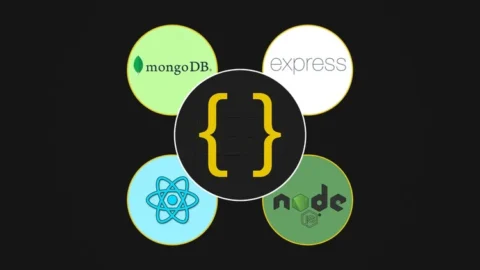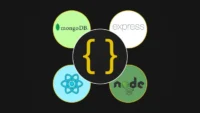
Copy this code and use at checkout
80% Off React, NodeJS, Express & MongoDB – The MERN Fullstack Guide Udemy coupon
Expires: No Expires
Submitted: 3 months ago
1. Course Overview and Core Offering
The “MERN Stack: Build Fullstack React, Node, Express, MongoDB Apps” is a comprehensive, project-focused online course designed to teach developers how to build full-stack web applications using the MERN stack. MERN is an acronym for MongoDB, Express.js, React.js, and Node.js. The course emphasizes practical application through building an entire project from scratch, combining theoretical knowledge with hands-on implementation.
Key takeaway: The course’s primary goal is to empower individuals with basic React knowledge to develop complete web applications using a popular and powerful technology stack.
2. MERN Stack Explained
The course explicitly defines the MERN stack: “MERN stands for MongoDB, Express.js, React.js and Node.js – and combined, these four technologies allow you to build amazing web applications.”
- MongoDB: A NoSQL database used for storing application data.
- Express.js: A minimalist web framework for Node.js, used for building robust APIs.
- React.js: A JavaScript library for building user interfaces (the frontend).
- Node.js: A JavaScript runtime environment, used for server-side development (the backend).
The course focuses on how these four technologies “work together step by step” to create a complete application.
Key takeaway: Understanding the individual components of the MERN stack and their synergistic relationship is central to the course’s learning objectives.
3. Target Audience and Prerequisites
The course is specifically tailored for developers who:
- “got basic React knowledge and now want to build a fullstack app”
- Are “Advanced React developers who are interested in connecting React apps to Node/ Express”
- Are “Node/ Express developers who want to learn how to add a modern frontend to their backend”
While “NO prior MERN stack knowledge is required,” the course strongly recommends “Basic React.js knowledge.” A brief refresher on React is included, but it’s explicitly stated that the course “is NOT meant to teach React from the ground up.” Basic Node and Express knowledge is also recommended but not mandatory.
Key takeaway: The course targets individuals with foundational React experience looking to expand into full-stack development, particularly with the MERN stack. It is not suitable for absolute beginners in web development or React.
4. Course Structure and Content Highlights
The course is extensive, offering “18.5 hours on-demand video,” “22 articles,” and “235 downloadable resources.” It combines theoretical refreshers with practical project sections.
Core content areas include:
- Connecting Technologies: Learning “how to connect ReactJS with NodeJS, Express & MongoDB.”
- Full Project Build: Building “an entire project from scratch!”
- Authentication & Authorization: Implementing “Authentication & Authorization” to control user access.
- File Upload: Adding “File Upload to ReactJS + Node/ Express Applications,” specifically for images.
- Deployment: “Detailed deployment instructions – including different ways of deploying the application.”
- Refreshers: Brief refreshers on the core technologies (React, Node, Express, MongoDB) are provided, with project sections to apply theoretical knowledge.
The course goes beyond basics, covering advanced topics like file upload, user authentication (signup + login), and user authorization.
Key takeaway: The course provides a holistic learning experience, covering not just the integration of MERN technologies but also crucial aspects of real-world application development like security and deployment.
5. Instructor Expertise and Course Quality
The course is co-taught by two experienced instructors: Maximilian Schwarzmüller and Manuel Lorenz.
- Maximilian Schwarzmüller: Specializes in React.js and Node/Express. He boasts “years of experience of working with these technologies and teaching them to other people.” He is a “freelance web developer and consultant,” with a background in both backend (PHP, NodeJS, Python) and frontend (React, Angular, VueJS) development. He also has “expert DevOps and cloud computing knowledge” and holds AWS certifications. As an instructor, he has a “track record of many 5-star rated courses and more than 2,000,000 students on Udemy.”
- Manuel Lorenz: Focuses on MongoDB. He has experience as a “business analyst” and a “web developer.” His background in consulting informs his ability to “evaluate solutions from an industry perspective as well as from a learner’s perspective,” identifying “pain points students might hit when learning these tools.”
Both instructors emphasize their commitment to providing “the best possible learning experience” and have co-founded Academind to achieve this.
Key takeaway: The course benefits from the combined expertise of two highly experienced instructors with strong track records in both development and education, promising a high-quality and well-structured learning experience.
6. Value Proposition and Guarantees
The course offers:
- Full lifetime access.
- Access on mobile and TV.
- A certificate of completion.
- A “30-Day Money-Back Guarantee,” reiterating confidence in the course’s value.
By the end of the course, students should “feel comfortable building your own MERN stack applications and you can build up on all the knowledge taught throughout this course to dive into your own projects and use-cases.”
Key takeaway: The course provides significant value through comprehensive content, lifetime access, and a money-back guarantee, aiming to equip students with practical skills for building MERN stack applications independently.
Frequently Asked Questions
What is the MERN stack and what does it stand for?
The MERN stack is a popular collection of technologies used for building full-stack web applications. “MERN” is an acronym that stands for:
- MongoDB: A NoSQL database that stores data in flexible, JSON-like documents.
- Express.js: A minimalist web framework for Node.js, used for building robust APIs.
- React.js: A JavaScript library for building user interfaces, specifically single-page applications.
- Node.js: A JavaScript runtime environment that allows developers to execute JavaScript code outside of a web browser, commonly used for backend development.
Together, these four technologies provide a comprehensive framework for developing both the frontend (user interface) and backend (server, database) of web applications.
What kind of applications can be built with the MERN stack?
The MERN stack is designed for building full-stack applications, meaning it covers both the user-facing part (frontend) and the server-side logic and data storage (backend). This includes a wide range of web applications such as:
- Single-page applications (SPAs)
- Interactive dashboards
- E-commerce platforms
- Social media applications
- Content management systems
- And any other web application that requires dynamic data interaction and a responsive user interface.
What are the main skills or knowledge recommended before learning the MERN stack through this course?
While no prior MERN stack knowledge is required for this particular course, it strongly recommends a basic understanding of React.js. Although a refresher on React is provided, the course is not intended to teach React from the ground up. Additionally, basic knowledge of Node.js and Express.js is recommended but not a strict requirement, suggesting that some foundational understanding of these technologies would be beneficial for students.
What core concepts are covered in a MERN stack development course?
A comprehensive MERN stack development course typically covers a wide range of core concepts essential for building full-stack applications. This includes:
- Connecting React.js with Node.js, Express.js, and MongoDB.
- Refreshing the basics of each individual MERN technology.
- Implementing user authentication (signup, login) and authorization (controlling access to resources).
- Adding file upload functionalities (e.g., image upload) for both sending from the frontend and receiving/processing on the backend.
- Understanding how the different MERN technologies integrate and work together in a complete project.
- Deployment strategies for launching MERN applications on various hosting services.
Is the course entirely theoretical, or does it involve practical application?
The MERN stack course emphasizes a project-focused approach, meaning it is far from being purely theoretical. It involves building an entire project from scratch, applying theoretical knowledge in practical scenarios. There are dedicated project sections for each technology, and a complete course project where all the technologies are combined into one application. This hands-on method ensures students learn by doing and gain practical experience in building full-stack applications.
Who are the instructors of this MERN stack course, and what are their backgrounds?
The course is taught by two instructors: Maximilian Schwarzmüller and Manuel Lorenz.
- Maximilian Schwarzmüller is an experienced web developer and instructor. He has a background in both backend (PHP, Laravel, Node.js, Python) and frontend (React, Angular, VueJS) development, and holds AWS certifications. He founded Academind with Manuel Lorenz and has taught over 2,000,000 students.
- Manuel Lorenz has a background as a business analyst and web developer. He combines self-taught knowledge with experience in a competitive consulting environment. He co-founded Academind with Maximilian Schwarzmüller, focusing on creating high-quality, understandable learning materials for web development and data science.
Together, they bring years of combined experience in working with and teaching MERN stack technologies.
What additional features beyond the basics does the course offer?
Beyond the fundamental aspects of connecting the MERN technologies, the course delves into advanced features crucial for real-world applications. These include:
- File (image) upload: Covering both the client-side (React.js) and server-side (Node.js/Express) aspects of handling file uploads.
- User authentication: Implementing robust signup and login functionalities.
- User authorization: Learning how to control access to specific resources based on user roles or permissions.
- Detailed deployment instructions: Guiding students on various methods to deploy their MERN applications to different hosting services. The course also provides brief refreshers on core technologies, quizzes, and extra resources to enhance the learning experience.
What is the primary outcome or benefit for students completing this MERN stack course?
Upon completing the course, students are expected to feel comfortable and confident in building their own MERN stack applications. The primary benefit is gaining the practical skills and knowledge to take their React expertise to the next level by developing full-stack web applications. This enables them to embark on their own projects and use-cases, transforming them into capable full-stack MERN developers ready to build amazing web applications.


Loading comments....